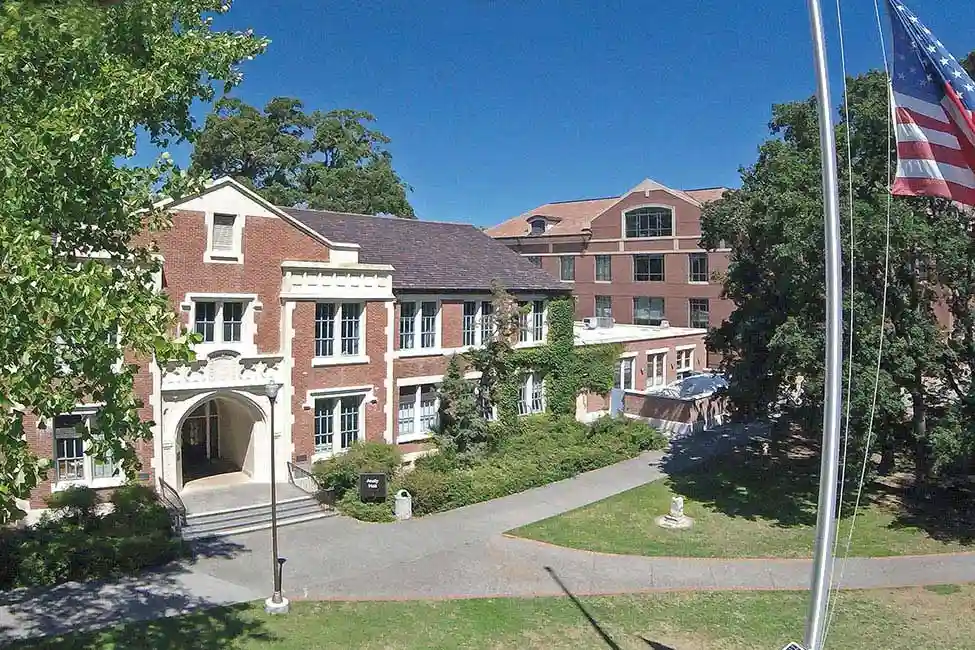
Study Anesthesia Technology in the USA

Want to be matched with Anesthesia Technology programs?
Let us know what you're looking for so we can find the best school for you.
Anesthesia Technology is the study of the principles, techniques, and equipment used to provide anesthesia care to patients during surgical or medical procedures. It involves the understanding of the pharmacology of anesthetic drugs, the physiology of the human body, and the practical skills required to manage anesthesia delivery systems.
Anesthesia Technologists, also known as Anesthesia Technicians, work closely with Anesthesiologists, Nurse Anesthetists, and other medical professionals to ensure the safe administration of anesthesia to patients. Their responsibilities include:
- Preparing and maintaining anesthesia equipment, such as anesthesia machines, monitors, and other devices.
- Assisting with the administration and monitoring of anesthesia during surgery or other medical procedures.
- Monitoring patients' vital signs, such as heart rate, blood pressure, and oxygen saturation, to ensure their safety and well-being during the administration of anesthesia.
- Troubleshooting any issues with anesthesia equipment or supplies, and ensuring that all equipment is functioning properly.
- Properly disposing of used anesthesia supplies, and maintaining a clean and sterile environment in the operating room or procedure area.
Anesthesia Technology programs, often offered as certificate or associate degree programs, provide students with the knowledge and skills necessary to become competent anesthesia technologists. The curriculum typically includes coursework in anatomy, physiology, pharmacology, medical terminology, anesthesia equipment, and patient monitoring, as well as hands-on clinical experience in a healthcare setting.

What does the study of Anesthesia Technology consist of?
The study of Anesthesia Technology consists of a combination of theoretical knowledge and practical skills necessary to assist in the safe administration of anesthesia to patients during surgical or medical procedures. The curriculum typically covers a range of topics, including:
- Anatomy and Physiology: Understanding the structure and function of the human body, including the respiratory, cardiovascular, and nervous systems, which are crucial for the safe administration and monitoring of anesthesia.
- Pharmacology: Learning about the various anesthetic drugs, their mechanisms of action, dosages, side effects, and potential interactions with other medications.
- Anesthesia Equipment: Gaining knowledge about different types of anesthesia machines, monitors, and other devices used in the administration of anesthesia. This includes understanding the proper setup, maintenance, and troubleshooting of the equipment.
- Patient Monitoring: Learning how to monitor patients' vital signs, such as heart rate, blood pressure, and oxygen saturation, during the administration of anesthesia. This helps ensure patient safety and well-being during surgical or medical procedures.
- Medical Terminology: Becoming familiar with the language and terminology used in the healthcare field, particularly in the context of anesthesia care.
- Anesthesia Techniques: Understanding various anesthesia techniques, such as general, regional, and local anesthesia, and their appropriate applications in different surgical or medical procedures.
- Infection Control and Sterilization: Learning about the importance of maintaining a clean and sterile environment in the operating room or procedure area, as well as proper handling and disposal of used anesthesia supplies.
- Professionalism and Ethics: Developing the professional and ethical standards expected of anesthesia technologists, including effective communication, teamwork, and patient advocacy.
In addition to classroom instruction, students in Anesthesia Technology programs typically gain hands-on clinical experience in a healthcare setting, working alongside experienced anesthesia providers. This practical training helps students develop the skills and competence needed to become effective anesthesia technologists.
What are the benefits of studying Anesthesia Technology in the U.S.?
Studying Anesthesia Technology in the U.S. offers several benefits for students pursuing a career in this field:
- Quality Education: The U.S. has a reputation for offering high-quality education in various healthcare disciplines, including Anesthesia Technology. Students have access to well-designed curricula, state-of-the-art facilities, and experienced faculty members.
- Accreditation: Anesthesia Technology programs in the U.S. are accredited by organizations such as the Commission on Accreditation of Allied Health Education Programs (CAAHEP). Accreditation ensures that the programs meet specific educational standards and provide students with the necessary knowledge and skills to succeed in the field.
- Career Opportunities: The U.S. has a diverse and advanced healthcare system, which creates numerous job opportunities for trained Anesthesia Technologists. Graduates can find employment in hospitals, ambulatory surgery centers, pain management clinics, and other healthcare facilities.
- Networking and Professional Development: Studying in the U.S. provides students with opportunities to network with fellow students, faculty, and professionals in the field. This networking can lead to job opportunities, mentorship, and professional growth.
- Certification: After completing an accredited Anesthesia Technology program, graduates can pursue certification through the American Society of Anesthesia Technologists and Technicians (ASATT). This certification demonstrates a commitment to professionalism and a high level of competence in the field, which can make graduates more competitive in the job market.
- Continuing Education: The U.S. offers numerous opportunities for continuing education and professional development in the field of Anesthesia Technology. This allows practitioners to stay current with the latest advancements, techniques, and best practices in anesthesia care.
- Cultural Diversity: Studying in the U.S. exposes students to a diverse population and a wide range of cultural experiences. This cultural exposure can enhance a student's ability to work effectively with patients and colleagues from diverse backgrounds.
Overall, studying Anesthesia Technology in the U.S. offers a comprehensive education, excellent career prospects, and access to resources and opportunities that can contribute to personal and professional growth in the field.

What colleges and universities in the U.S. have strong Anesthesia Technology programs?
While specific rankings for Anesthesia Technology programs are not widely available, several colleges and universities in the U.S. have strong and accredited programs in this field. Some of these institutions include:
- City College of San Francisco (CCSF), California: CCSF offers an accredited Anesthesia Technologist program, providing students with a comprehensive curriculum and hands-on clinical experience.
- Milwaukee Area Technical College (MATC), Wisconsin: MATC offers an Associate of Applied Science (AAS) degree in Anesthesia Technology, which is accredited by the Commission on Accreditation of Allied Health Education Programs (CAAHEP).
- Spokane Community College, Washington: This college offers an Anesthesia Technology program that provides students with the knowledge and skills necessary to work alongside anesthesia providers in various healthcare settings.
- Nova Southeastern University, Florida: The Anesthesia Technology program at Nova Southeastern University is accredited by CAAHEP and prepares students to become Certified Anesthesia Technologists.
- University of Alabama at Birmingham (UAB), Alabama: UAB's Surgical Physician Assistant program includes a specialized track in Anesthesia, which covers Anesthesia Technology principles and practices.
What community colleges have strong Anesthesia Technology programs?
Several community colleges in the United States have strong and accredited Anesthesia Technology programs. These programs often offer associate degrees or certificates, providing students with the necessary knowledge and skills to succeed in the field. Some of these community colleges include:
- City College of San Francisco (CCSF), California: CCSF offers an accredited Anesthesia Technologist program that combines classroom instruction with hands-on clinical experience.
- Milwaukee Area Technical College (MATC), Wisconsin: MATC provides an Associate of Applied Science (AAS) degree in Anesthesia Technology, which is accredited by the Commission on Accreditation of Allied Health Education Programs (CAAHEP).
- Spokane Community College, Washington: The Anesthesia Technology program at Spokane Community College prepares students to work as Anesthesia Technologists in various healthcare settings.
- Renton Technical College, Washington: Renton Technical College offers an Anesthesia Technologist program, providing students with a comprehensive education that includes both classroom instruction and clinical experience.
- Hillsborough Community College, Florida: The Anesthesia Technology program at Hillsborough Community College is designed to prepare students for a career in anesthesia care, with an emphasis on hands-on training.
Please note that the list above is not exhaustive, and it's essential to research and consider factors such as accreditation, program curriculum, clinical experience opportunities, and the institution's reputation when selecting an Anesthesia Technology program. Additionally, the availability of programs and their specific details may change over time, so it is advisable to verify the information with the respective institutions before making a decision.

What kind of career opportunities will I have after studying Anesthesia Technology in the U.S.?
After completing an accredited Anesthesia Technology program in the U.S., graduates have a variety of career opportunities within the healthcare field. Some of the settings and roles that Anesthesia Technologists may find employment in include:
- Hospitals: Anesthesia Technologists often work in the operating rooms, assisting anesthesiologists, nurse anesthetists, and other medical professionals in the administration and monitoring of anesthesia during surgeries and other procedures.
- Ambulatory Surgery Centers: These outpatient facilities perform surgical procedures that do not require an overnight hospital stay, and Anesthesia Technologists may work alongside anesthesia providers in these centers.
- Pain Management Clinics: Anesthesia Technologists may assist with the administration of anesthesia or other pain management techniques in clinics specializing in chronic pain management.
- Dental Offices: Some dental procedures, such as oral surgery, may require the administration of anesthesia. Anesthesia Technologists may work in dental offices, assisting dentists and other dental professionals with these procedures.
- Obstetrics and Gynecology: Anesthesia Technologists may work in labor and delivery units or other areas of women's health where anesthesia is administered, such as during cesarean sections or gynecological surgeries.
- Educational Institutions: Experienced Anesthesia Technologists may choose to teach in Anesthesia Technology programs or provide continuing education courses for professionals in the field.
- Equipment Sales and Service: With their knowledge of anesthesia equipment and devices, some Anesthesia Technologists may choose to work in sales or service roles for medical equipment manufacturers or suppliers.
- Research and Development: Anesthesia Technologists with an interest in research may find opportunities to contribute to the development of new anesthesia techniques, equipment, or drugs.
Certification through the American Society of Anesthesia Technologists and Technicians (ASATT) can enhance job prospects and demonstrate a high level of competence in the field. Overall, a career in Anesthesia Technology offers a diverse range of opportunities in various healthcare settings, making it an appealing choice for those interested in the medical field.
Useful Articles
Check Out These Schools




East Los Angeles College
Typical cost per Semester: $10,000 — $15,000

University of North Georgia
Typical cost per Year: $15,000—$20,000

Santa Rosa Junior College
Typical cost per Year: $10,000 — $15,000



















